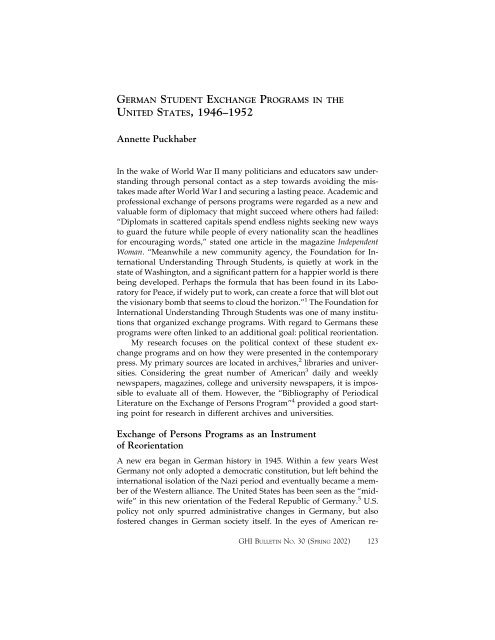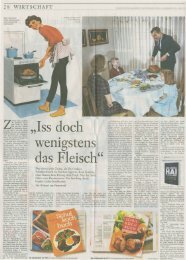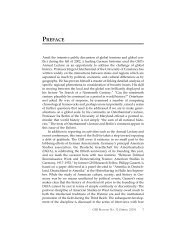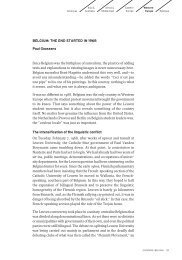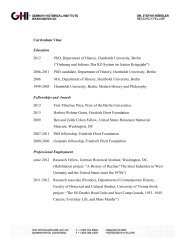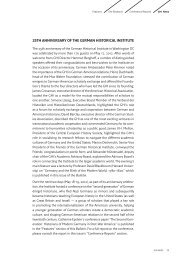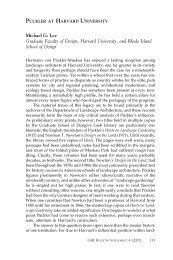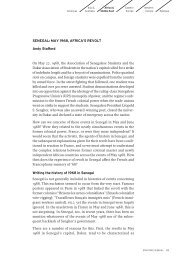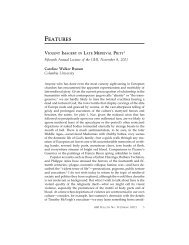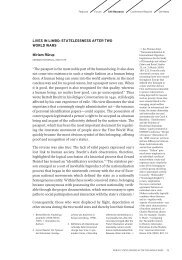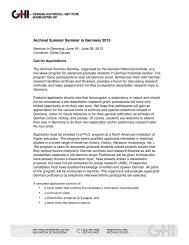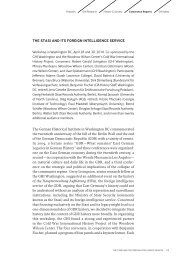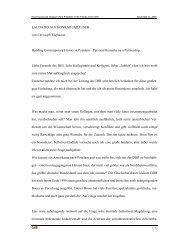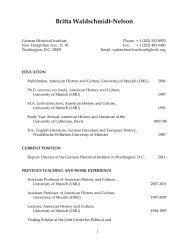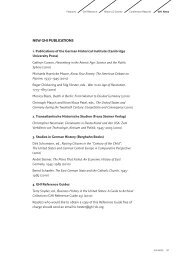German Student Exchange Programs in the United States, 1946-1952
German Student Exchange Programs in the United States, 1946-1952
German Student Exchange Programs in the United States, 1946-1952
You also want an ePaper? Increase the reach of your titles
YUMPU automatically turns print PDFs into web optimized ePapers that Google loves.
GERMAN STUDENT EXCHANGE PROGRAMS IN THE<br />
UNITED STATES, <strong>1946</strong>–<strong>1952</strong><br />
Annette Puckhaber<br />
In <strong>the</strong> wake of World War II many politicians and educators saw understand<strong>in</strong>g<br />
through personal contact as a step towards avoid<strong>in</strong>g <strong>the</strong> mistakes<br />
made after World War I and secur<strong>in</strong>g a last<strong>in</strong>g peace. Academic and<br />
professional exchange of persons programs were regarded as a new and<br />
valuable form of diplomacy that might succeed where o<strong>the</strong>rs had failed:<br />
“Diplomats <strong>in</strong> scattered capitals spend endless nights seek<strong>in</strong>g new ways<br />
to guard <strong>the</strong> future while people of every nationality scan <strong>the</strong> headl<strong>in</strong>es<br />
for encourag<strong>in</strong>g words,” stated one article <strong>in</strong> <strong>the</strong> magaz<strong>in</strong>e Independent<br />
Woman. “Meanwhile a new community agency, <strong>the</strong> Foundation for International<br />
Understand<strong>in</strong>g Through <strong>Student</strong>s, is quietly at work <strong>in</strong> <strong>the</strong><br />
state of Wash<strong>in</strong>gton, and a significant pattern for a happier world is <strong>the</strong>re<br />
be<strong>in</strong>g developed. Perhaps <strong>the</strong> formula that has been found <strong>in</strong> its Laboratory<br />
for Peace, if widely put to work, can create a force that will blot out<br />
<strong>the</strong> visionary bomb that seems to cloud <strong>the</strong> horizon.” 1 The Foundation for<br />
International Understand<strong>in</strong>g Through <strong>Student</strong>s was one of many <strong>in</strong>stitutions<br />
that organized exchange programs. With regard to <strong>German</strong>s <strong>the</strong>se<br />
programs were often l<strong>in</strong>ked to an additional goal: political reorientation.<br />
My research focuses on <strong>the</strong> political context of <strong>the</strong>se student exchange<br />
programs and on how <strong>the</strong>y were presented <strong>in</strong> <strong>the</strong> contemporary<br />
press. My primary sources are located <strong>in</strong> archives, 2 libraries and universities.<br />
Consider<strong>in</strong>g <strong>the</strong> great number of American 3 daily and weekly<br />
newspapers, magaz<strong>in</strong>es, college and university newspapers, it is impossible<br />
to evaluate all of <strong>the</strong>m. However, <strong>the</strong> “Bibliography of Periodical<br />
Literature on <strong>the</strong> <strong>Exchange</strong> of Persons Program” 4 provided a good start<strong>in</strong>g<br />
po<strong>in</strong>t for research <strong>in</strong> different archives and universities.<br />
<strong>Exchange</strong> of Persons <strong>Programs</strong> as an Instrument<br />
of Reorientation<br />
A new era began <strong>in</strong> <strong>German</strong> history <strong>in</strong> 1945. With<strong>in</strong> a few years West<br />
<strong>German</strong>y not only adopted a democratic constitution, but left beh<strong>in</strong>d <strong>the</strong><br />
<strong>in</strong>ternational isolation of <strong>the</strong> Nazi period and eventually became a member<br />
of <strong>the</strong> Western alliance. The <strong>United</strong> <strong>States</strong> has been seen as <strong>the</strong> “midwife”<br />
<strong>in</strong> this new orientation of <strong>the</strong> Federal Republic of <strong>German</strong>y. 5 U.S.<br />
policy not only spurred adm<strong>in</strong>istrative changes <strong>in</strong> <strong>German</strong>y, but also<br />
fostered changes <strong>in</strong> <strong>German</strong> society itself. In <strong>the</strong> eyes of American re-<br />
GHI BULLETIN NO. 30(SPRING 2002) 123
formers, <strong>the</strong> earlier failure of <strong>German</strong> democracy was less a structural<br />
failure than <strong>the</strong> result of <strong>the</strong> prevail<strong>in</strong>g authoritarian, illiberal and antidemocratic<br />
educational ideas. 6 U.S. policy aimed at a reorientation. 7 The<br />
aim was not to superimpose <strong>the</strong> American political system, but ra<strong>the</strong>r to<br />
<strong>in</strong>stall democratic values <strong>in</strong> <strong>the</strong> m<strong>in</strong>ds of <strong>German</strong>s. Genu<strong>in</strong>e reform, U.S.<br />
officials realized, had to come from <strong>the</strong> <strong>German</strong>s <strong>the</strong>mselves. <strong>Exchange</strong><br />
programs were seen as contribut<strong>in</strong>g to this goal.<br />
The first tentative steps were taken <strong>in</strong> <strong>1946</strong>, when 50 students from<br />
<strong>German</strong>y visited <strong>the</strong> <strong>United</strong> <strong>States</strong>. Endorsed by <strong>the</strong> Military Government<br />
for <strong>the</strong> first few years, <strong>the</strong> exchange was carried out largely at <strong>the</strong> <strong>in</strong>itiative<br />
of private organizations. The exchange programs became an <strong>in</strong>tegral<br />
part of <strong>the</strong> American policy of democratization <strong>in</strong> <strong>German</strong>y. In 1949 <strong>the</strong><br />
Office of U.S. Military Government (OMGUS) launched its “<strong>German</strong> Program”<br />
which came under <strong>the</strong> auspices of <strong>the</strong> Office of <strong>the</strong> U.S. High<br />
Commissioner (HICOG) <strong>in</strong> 1950. 8 The program was one-sided <strong>in</strong> many<br />
aspects: “. . . <strong>the</strong> <strong>German</strong> program started out as a unilateral American<strong>in</strong>itiated,<br />
American-funded, and American-directed implement of <strong>United</strong><br />
<strong>States</strong> policy serv<strong>in</strong>g primarily <strong>United</strong> <strong>States</strong> <strong>in</strong>terests.” 9 Less an exchange<br />
than a program to br<strong>in</strong>g <strong>German</strong>s to <strong>the</strong> <strong>States</strong>, it was <strong>in</strong>tended to<br />
show <strong>German</strong>s a democracy at work: “The <strong>Exchange</strong> Program means,<br />
primarily, that <strong>German</strong>s sponsored by some organization, <strong>in</strong>stitution or<br />
group are sent to <strong>the</strong> <strong>United</strong> <strong>States</strong> for a period of study and observation<br />
of <strong>the</strong> American way of life, our <strong>in</strong>stitutions, <strong>the</strong> operation of constitutional<br />
government based on <strong>the</strong> democratic ideal.” 10<br />
The details of <strong>the</strong> programs were <strong>in</strong> most cases left to <strong>the</strong> organizations<br />
<strong>in</strong>volved with a m<strong>in</strong>imum of official <strong>in</strong>terference. Although <strong>the</strong> U.S.<br />
government actively sought a reorientation of <strong>German</strong>y, <strong>the</strong> operation of<br />
<strong>the</strong> exchange programs did not much <strong>in</strong>terest American officials. They<br />
believed that a first-hand view of democracy would automatically br<strong>in</strong>g<br />
about <strong>the</strong> desired change of attitude, belief and behavior. As George<br />
Shuster noted: “<strong>Exchange</strong> was at first conceived of by <strong>the</strong> Occupation as<br />
an <strong>in</strong>strument for smuggl<strong>in</strong>g <strong>in</strong> democratic bacteria. Believ<strong>in</strong>g that exposure<br />
to life <strong>in</strong> <strong>the</strong> <strong>United</strong> <strong>States</strong> was <strong>the</strong> best way of produc<strong>in</strong>g carriers<br />
and <strong>the</strong>rewith contagion, a very great many people, young and old, were<br />
dispatched to this country.” 11<br />
The U.S. government did, however, take an <strong>in</strong>terest <strong>in</strong> <strong>the</strong> selection of<br />
<strong>the</strong> exchange participants as far as it perta<strong>in</strong>ed to questions of national<br />
security. Excluded from participation were persons convicted by a court<br />
of <strong>the</strong> occupational powers, former members of now banned organizations<br />
(e.g. <strong>the</strong> NSDAP or o<strong>the</strong>r voluntary organizations associated with<br />
<strong>the</strong> Nazi regime) or persons who had been known for an antidemocratic<br />
conviction as well as members of communist organizations. <strong>Exchange</strong><br />
participants <strong>in</strong>cluded children of former prisoners of war as well as of<br />
124 GHI BULLETIN NO. 30(SPRING 2002)
former Nazi leaders. 12 Individuals were not held responsible for crimes<br />
committed by <strong>the</strong>ir family members. As <strong>the</strong> exchange programs expanded,<br />
officials paid <strong>in</strong>creas<strong>in</strong>g attention to <strong>in</strong>dividual records ra<strong>the</strong>r<br />
than <strong>the</strong> simple question of membership <strong>in</strong> Nazi organizations. In some<br />
cases exchange participants had to go through as many as seven security<br />
checks to obta<strong>in</strong> a military exit permit and a visitor’s visa. 13<br />
While <strong>the</strong> program started out <strong>in</strong> <strong>the</strong> U.S. occupation zone, once <strong>the</strong><br />
Federal Republic of <strong>German</strong>y was founded persons from o<strong>the</strong>r parts of<br />
<strong>the</strong> country were allowed to apply as well. 14 By <strong>the</strong> comb<strong>in</strong>ed efforts of<br />
private and governmental organizations, about 3,000 <strong>German</strong> students<br />
visited <strong>the</strong> <strong>United</strong> <strong>States</strong> between <strong>1946</strong> and <strong>1952</strong>. 15 They were chosen on<br />
<strong>the</strong> basis of <strong>the</strong>ir knowledge of English as well as <strong>the</strong>ir declared will<strong>in</strong>gness<br />
to return to <strong>German</strong>y afterwards, and <strong>the</strong>y needed private sponsors<br />
<strong>in</strong> <strong>the</strong> <strong>United</strong> <strong>States</strong>. <strong>Student</strong>s were not <strong>the</strong> only group participat<strong>in</strong>g <strong>in</strong> <strong>the</strong><br />
exchange programs but <strong>the</strong>ir situation differed from that of o<strong>the</strong>rs.<br />
<strong>German</strong> Youth as an Investment <strong>in</strong> a Democratic Future<br />
<strong>Exchange</strong> programs generally targeted “leaders” and, <strong>in</strong> <strong>the</strong> case of<br />
young people, “future leaders.” The <strong>in</strong>clusion of young people was important.<br />
On <strong>the</strong> one hand, <strong>the</strong>y had to be at <strong>the</strong> center of a democratic<br />
renewal if changes <strong>in</strong> <strong>German</strong> society were to last. On <strong>the</strong> o<strong>the</strong>r hand,<br />
National Socialism had had a bigger impact on youth than on any o<strong>the</strong>r<br />
group. Unlike <strong>the</strong>ir parents or grandparents, young people were not able<br />
to fall back on social values that had been promoted before National<br />
Socialism. All <strong>the</strong>y knew was society as it had existed dur<strong>in</strong>g <strong>the</strong> twelve<br />
years of <strong>the</strong> Nazi regime. However, adolescence is a period of evaluation.<br />
Values, norms, styles of conduct are exam<strong>in</strong>ed, reflected upon, accepted<br />
and <strong>in</strong>ternalized—or discarded. Dur<strong>in</strong>g this time a young person develops<br />
a stand <strong>in</strong> favor of or aga<strong>in</strong>st a system and its representatives. Goals<br />
and methods to achieve <strong>the</strong>m are questioned. 16 <strong>German</strong> youth of <strong>the</strong><br />
postwar period needed alternative concepts of community and social<br />
behavior. This was recognized by occupation officials: “After <strong>the</strong> total<br />
bankruptcy of National Socialism, to which all young people were exposed<br />
<strong>in</strong> <strong>the</strong>ir formative years, <strong>the</strong>re rema<strong>in</strong>s very little to give <strong>the</strong>ir lives<br />
a new direction. They live <strong>in</strong> a society characterized by political, economic,<br />
and social disorganization, where democratic ideas have not taken<br />
sufficient root to give rise to a new growth of culture and education. The<br />
importation of new ideas and methods through exchange of books, magaz<strong>in</strong>es,<br />
educational films, etc., while of great value to a reeducation program,<br />
cannot alone accomplish <strong>the</strong> task. It is imperative, <strong>the</strong>refore, that a<br />
large number of young <strong>German</strong>s be brought face to face with a democratic<br />
way of life, with<strong>in</strong> <strong>the</strong> <strong>United</strong> <strong>States</strong> and o<strong>the</strong>r countries.” 17<br />
GHI BULLETIN NO. 30(SPRING 2002) 125
<strong>Exchange</strong> participants were chosen on <strong>the</strong> basis of several criteria<br />
relat<strong>in</strong>g to democratic viewpo<strong>in</strong>ts and qualities of leadership: “Not only<br />
scholastic records are considered but also general personality and appearance,<br />
promise of leadership, adaptability, political record, and openm<strong>in</strong>dedness.”<br />
18 The mean<strong>in</strong>g of leadership potential rema<strong>in</strong>ed vague, as<br />
<strong>the</strong> Chief of <strong>the</strong> Cultural <strong>Exchange</strong> Section with<strong>in</strong> <strong>the</strong> Education and<br />
Cultural Relations Division of OMGUS admitted: “‘Leaders’ is an elastic<br />
category <strong>in</strong>clud<strong>in</strong>g anyone who goes to attend a conference, teach or<br />
lecture, confer, receive on-<strong>the</strong>-job tra<strong>in</strong><strong>in</strong>g or carry out planned observation—<strong>in</strong><br />
short all types of activity <strong>in</strong> <strong>the</strong> cultural fields except matriculated<br />
study.” 19 Previous membership <strong>in</strong> <strong>the</strong> Hitler Youth did not necessarily<br />
exclude young people from participation <strong>in</strong> an exchange.<br />
Individual records were taken <strong>in</strong>to considerations by look<strong>in</strong>g at <strong>the</strong> date<br />
and age of <strong>the</strong>ir admission. 20<br />
The <strong>German</strong> <strong>Student</strong> <strong>Exchange</strong> through <strong>the</strong> Eyes of <strong>the</strong><br />
American Public: Reasons for Br<strong>in</strong>g<strong>in</strong>g <strong>German</strong> <strong>Student</strong>s to<br />
<strong>the</strong> <strong>United</strong> <strong>States</strong><br />
The youth programs received widespread attention <strong>in</strong> <strong>the</strong> U.S. media.<br />
While newspapers referred to <strong>the</strong> purpose of <strong>the</strong> exchange of persons<br />
programs and <strong>the</strong> selection of <strong>the</strong> participants only <strong>in</strong> <strong>the</strong> broadest terms,<br />
<strong>the</strong>y often gave exchanges repeated coverage. What <strong>the</strong>mes and <strong>in</strong>terests<br />
did <strong>the</strong> articles focus on?<br />
The American Field Service (AFS) was <strong>the</strong> most prom<strong>in</strong>ent organization<br />
<strong>in</strong>volved <strong>in</strong> <strong>the</strong> exchange of high school students, and its visit<strong>in</strong>g<br />
students were frequently <strong>the</strong> subject of press coverage. AFS presented its<br />
exchange program to <strong>the</strong> public as follows: “The aim is to assure that<br />
young people whose records mark <strong>the</strong>m as future leaders <strong>in</strong> <strong>the</strong>ir own<br />
lands shall learn from personal experience what <strong>the</strong> <strong>United</strong> <strong>States</strong> is really<br />
like. Part of <strong>the</strong> program is to offer <strong>the</strong>se young people many opportunities<br />
to meet Americans, receive <strong>the</strong>ir hospitality, and to travel widely<br />
dur<strong>in</strong>g <strong>the</strong>ir stay here. It is <strong>the</strong> hope of <strong>the</strong> American Field Service—and<br />
a worthy hope—that <strong>the</strong>se young men and women will return to <strong>the</strong>ir<br />
native countries with a true understand<strong>in</strong>g of American democracy and<br />
a friendship for American people.” 21 For <strong>the</strong> American Field Service, <strong>the</strong><br />
<strong>German</strong> student exchange was part of a general exchange program. AFS<br />
saw its mandate <strong>in</strong> promot<strong>in</strong>g “goodwill among nations,” 22 a broader<br />
approach that tied <strong>the</strong> reorientation of <strong>German</strong>s to <strong>the</strong> concept of <strong>in</strong>ternational<br />
understand<strong>in</strong>g as a path to ma<strong>in</strong>ta<strong>in</strong> peace. This did not mean<br />
that AFS students from <strong>German</strong>y were not aware of <strong>the</strong>ir special mission.<br />
In an <strong>in</strong>terview, Klaus B. expressed his hope to take home democracy<br />
with him. 23 Eva K. expla<strong>in</strong>ed: “’My duty <strong>in</strong> com<strong>in</strong>g to America ...wasto<br />
126 GHI BULLETIN NO. 30(SPRING 2002)
come over and get to know <strong>the</strong> American everyday life and to see Americans<br />
all toge<strong>the</strong>r. I am to br<strong>in</strong>g a fair impression back to <strong>German</strong>y”, and<br />
she added, “to tell Americans what we are do<strong>in</strong>g <strong>in</strong> <strong>German</strong>y and what<br />
problems we have.” 24<br />
Newspaper articles generally gave two basic reasons for welcom<strong>in</strong>g<br />
<strong>the</strong> exchange participants to <strong>the</strong> <strong>United</strong> <strong>States</strong>: to teach young <strong>German</strong>s<br />
<strong>the</strong> value of democracy and to dispel <strong>the</strong>ir frequent misconceptions about<br />
Americans. There were many misconceptions, although <strong>in</strong> some cases<br />
<strong>the</strong>y derived from a simple lack of knowledge. 25 Technical terms like<br />
re-education and reorientation were hardly ever mentioned <strong>in</strong> <strong>the</strong> media<br />
coverage, nor were <strong>the</strong> reasons for <strong>the</strong> exchange program discussed. U.S.<br />
officials emphasized that <strong>the</strong> exchange programs spread knowledge<br />
about and sympathy for <strong>the</strong> <strong>United</strong> <strong>States</strong>: “It [<strong>the</strong> exchange program] is<br />
all part of <strong>the</strong> <strong>in</strong>creas<strong>in</strong>g effort on <strong>the</strong> part of this nation to be correctly<br />
‘understood’ by representatives of o<strong>the</strong>r nations which, by reason of geographic<br />
separation, may not be <strong>in</strong> position to know <strong>the</strong> motives which<br />
impel us <strong>in</strong> our <strong>in</strong>ternational diplomacy.” The article cont<strong>in</strong>ued, however:<br />
“They [<strong>the</strong> exchange students] will help our own students to understand<br />
<strong>the</strong> problems of o<strong>the</strong>r lands and to appreciate <strong>the</strong> oneness of different<br />
races and nationalities.” And on a critical note <strong>the</strong> article stated: “Then<br />
Americans would be more certa<strong>in</strong> to step lightly <strong>in</strong> o<strong>the</strong>r lands, to boast<br />
less, and to talk more of our hope for peace than of <strong>the</strong> prospect of war.<br />
If o<strong>the</strong>r peoples knew us better, we would be more sure of ourselves.” 26<br />
Although this was not specifically <strong>in</strong>tended, newspapers acknowledged<br />
that even a “one-sided” exchange <strong>in</strong>volved two parties and just as <strong>the</strong><br />
guests got to know <strong>the</strong>ir hosts, <strong>the</strong> hosts also got to know <strong>the</strong>ir guests.<br />
Many Americans were curious about <strong>the</strong> situation <strong>in</strong> Europe and political<br />
developments <strong>in</strong> <strong>German</strong>y. One college paper asked:“Would Western<br />
<strong>German</strong>y fight on <strong>the</strong> side of <strong>the</strong> U.S. <strong>in</strong> a war aga<strong>in</strong>st Russia should such<br />
a war come? What is <strong>the</strong> attitude toward <strong>the</strong> U.S. <strong>in</strong> <strong>German</strong>y? How<br />
strong is nationalism <strong>in</strong> <strong>German</strong>y?” 27<br />
The <strong>Exchange</strong>s as a Community Effort<br />
Not only curiosity awaited <strong>the</strong> participants upon <strong>the</strong>ir arrival, but whole<br />
communities planned <strong>the</strong>ir welcome. Newspaper articles testified to <strong>the</strong><br />
high degree of community <strong>in</strong>volvement <strong>in</strong> <strong>the</strong> exchange programs. Individuals,<br />
groups, town councils, local Rotary and Kiwani clubs, <strong>the</strong> American<br />
Legion, and many more participated <strong>in</strong> <strong>the</strong> preparations as well as <strong>the</strong><br />
operation of <strong>the</strong> exchange. Friends and relatives of particular <strong>German</strong><br />
students funded <strong>in</strong>dividual scholarships, but churches and <strong>in</strong>stitutions of<br />
higher education sponsored <strong>the</strong> majority of <strong>the</strong> participants. Frank Banta,<br />
Chief of <strong>the</strong> Cultural <strong>Exchange</strong> Section, noted <strong>in</strong> 1948: “Religious groups<br />
GHI BULLETIN NO. 30(SPRING 2002) 127
have been <strong>the</strong> most active <strong>in</strong> giv<strong>in</strong>g scholarships to <strong>German</strong> students: The<br />
National Catholic Welfare Committee, <strong>the</strong> World Council of Churches<br />
(Protestant), <strong>the</strong> Mennonites, <strong>the</strong> Quakers and <strong>the</strong> Church of Christ have<br />
each given three to 21 scholarships. The University of Kentucky and<br />
Michigan State College have each given three scholarships and o<strong>the</strong>rs<br />
have been offered by Mississippi, M<strong>in</strong>nesota, Wash<strong>in</strong>gton State and Massachusetts<br />
Institute of Technology.” 28<br />
But community <strong>in</strong>volvement went far beyond scholarships. Volunteers<br />
were kept busy with fundrais<strong>in</strong>g, <strong>the</strong>y had to f<strong>in</strong>d host families<br />
will<strong>in</strong>g to offer board and lodg<strong>in</strong>g to <strong>the</strong> visitors <strong>in</strong> <strong>the</strong>ir homes, and <strong>the</strong>y<br />
had to organize events and special activities for <strong>the</strong> guests. The response<br />
with<strong>in</strong> communities was sometimes overwhelm<strong>in</strong>g. In Ridgewood a<br />
higher number of families responded than needed: “Fearful at first that<br />
<strong>the</strong>y would have difficulty gett<strong>in</strong>g enough beds for <strong>the</strong>m [196 exchange<br />
participants], committee members had to fight off eager residents of<br />
Ridgewood and surround<strong>in</strong>g towns ...,allof<strong>the</strong>m clamor<strong>in</strong>g for a foreign<br />
student guest.” 29 The exchange participants were swamped with<br />
<strong>in</strong>vitations to give public lectures or to attend formal as well as <strong>in</strong>formal<br />
d<strong>in</strong>ners, lawn parties, picnics and barbecues; companies and communities<br />
outside <strong>the</strong> school district <strong>in</strong>vited <strong>the</strong> foreigners to visit. With <strong>the</strong><br />
assistance of Greyhound, <strong>the</strong> American Field Service organized bus trips<br />
around <strong>the</strong> country for <strong>the</strong>ir students. Many wanted to chip <strong>in</strong>to and to<br />
jo<strong>in</strong> <strong>in</strong> <strong>the</strong> hospitality to make <strong>the</strong> guests feel welcome. In many cases, <strong>the</strong><br />
exchange participants became a focus of discussions, plann<strong>in</strong>g committees,<br />
and council meet<strong>in</strong>gs before <strong>the</strong>y even set foot on American soil.<br />
As a result, <strong>the</strong> arrival of <strong>the</strong> exchange participants was anticipated<br />
by <strong>the</strong>ir host families and whole communities and regions. To satisfy<br />
public <strong>in</strong>terest, media coverage followed <strong>the</strong> exchange participants. Requests<br />
from reporters, newsreel cameramen and photographers for exchange<br />
students to pose for pictures became common dur<strong>in</strong>g <strong>the</strong>ir stay,<br />
but particularly while travel<strong>in</strong>g. The Sunday News remarked: “Used to<br />
this [<strong>the</strong> media attention], <strong>the</strong>y flung <strong>the</strong>mselves <strong>in</strong>to <strong>the</strong> spirit of <strong>the</strong><br />
th<strong>in</strong>g like veterans.” 30 A particular active exchange participant spoke<br />
supposedly to an estimated 6,000,000 students and 15,000,000 adults,<br />
partly through personal appearances, but ma<strong>in</strong>ly thanks to 15 radio or<br />
television shows. 31<br />
The public support for <strong>the</strong> program <strong>in</strong> <strong>the</strong> <strong>United</strong> <strong>States</strong> was less <strong>the</strong><br />
result of a successful exchange than a predisposition. Thus <strong>the</strong> newspaper<br />
articles <strong>in</strong>cluded hardly any critical analysis of <strong>the</strong> political aims of <strong>the</strong><br />
exchange program, but mostly human-<strong>in</strong>terest stories. Readers wanted to<br />
read about <strong>the</strong> persons <strong>the</strong>ir community sponsored, <strong>the</strong>y were look<strong>in</strong>g for<br />
reports on <strong>the</strong> activities of <strong>the</strong> exchange participants and quotes on <strong>the</strong>ir<br />
adaptation and <strong>the</strong>ir impressions of <strong>the</strong> <strong>United</strong> <strong>States</strong>. Of course, <strong>the</strong>y<br />
128 GHI BULLETIN NO. 30(SPRING 2002)
were also <strong>in</strong>terested <strong>in</strong> read<strong>in</strong>g about <strong>the</strong>ir own good deeds: Not surpris<strong>in</strong>gly,<br />
many articles mentioned host families by name and would sometimes<br />
report on admirable community efforts <strong>in</strong> a column such as “Good<br />
Citizens At Work.” 32 In general <strong>the</strong>se efforts lasted to <strong>the</strong> very last day of<br />
<strong>the</strong> exchange participants’ stay. In Lima <strong>the</strong> city presented <strong>the</strong>ir stop-over<br />
visitors on <strong>the</strong>ir f<strong>in</strong>al bus trip around <strong>the</strong> country with a package of<br />
souvenirs as a remembrance. 33 At <strong>the</strong> Amarillo High School students<br />
collected money to buy true Texas-style farewell gifts for <strong>the</strong>ir two exchange<br />
participants: Both boys received a large Western hat, a wide<br />
lea<strong>the</strong>r belt and real cowboy boots. 34 This last example showed that even<br />
peer groups <strong>in</strong>volved <strong>the</strong>mselves actively <strong>in</strong> <strong>the</strong> community activities.<br />
Deal<strong>in</strong>g with <strong>the</strong> <strong>German</strong> Past<br />
While it was true that most articles, particularly <strong>in</strong> smaller newspapers,<br />
did not discuss political issues, <strong>the</strong>ir readers found some references to <strong>the</strong><br />
<strong>German</strong> past <strong>in</strong> quotes from exchange participants. Many <strong>German</strong> students<br />
expressed astonishment about <strong>the</strong>ir warm welcome and <strong>the</strong> lack of<br />
resentments expressed by Americans upon meet<strong>in</strong>g former enemy aliens.<br />
“Although many Americans view <strong>the</strong> <strong>German</strong> nation as a whole with<br />
some skepticism or at least reserve, <strong>the</strong>re was scarcely any resentment<br />
aga<strong>in</strong>st <strong>the</strong> <strong>in</strong>dividual <strong>German</strong>, provided he showed some tact and tolerance<br />
<strong>in</strong> human relationships,” said Friedrich G. 35 For some <strong>the</strong> stay <strong>in</strong><br />
<strong>the</strong> <strong>United</strong> <strong>States</strong> meant an escape from everyday confrontations with <strong>the</strong><br />
<strong>German</strong> past. “I like it here because <strong>the</strong>y don’t ask you if you are Catholic<br />
or <strong>German</strong> or Jewish or Irish, but <strong>in</strong>stead, if you know how to drive a<br />
truck, or write well,” Manfred P. told one journalist. 36 An exchange particularly<br />
under <strong>the</strong> auspices of an <strong>in</strong>ternational exchange program, like<br />
<strong>the</strong> American Field Service, which did not limit its program to <strong>German</strong>s<br />
only, sometimes offered temporary national anonymity. <strong>German</strong>s reflected<br />
on differences between <strong>the</strong> host country and <strong>the</strong>ir homes, but <strong>in</strong><br />
<strong>the</strong>ir adaptation to <strong>the</strong> <strong>United</strong> <strong>States</strong> <strong>the</strong>y were <strong>in</strong> <strong>the</strong> same boat as exchange<br />
participants from Belgium, F<strong>in</strong>land, France or Norway.<br />
In <strong>the</strong>ir reflections on <strong>German</strong>y <strong>the</strong> exchange participants rema<strong>in</strong>ed<br />
fairly superficial. The <strong>German</strong> past was hardly ever addressed <strong>in</strong> a direct<br />
way. <strong>German</strong>y was presented as a war-torn country: “<strong>German</strong>y is extremely<br />
war-weary; <strong>the</strong> destruction of Allied bombers is still visable almost<br />
everywhere; on street corners <strong>in</strong> every city and town begg<strong>in</strong>g warcripples<br />
are grim rem<strong>in</strong>ders to <strong>the</strong> people; and <strong>the</strong> dismantl<strong>in</strong>g of basic<br />
<strong>in</strong>dustries has only just ceased.” 37 “Our ma<strong>in</strong> thought is to rebuild our<br />
country,” Herwig L. emphasized. 38 The students projected to <strong>the</strong> American<br />
public a perception of <strong>German</strong>y as a country that had suffered as a<br />
result of <strong>the</strong> war and was fac<strong>in</strong>g <strong>the</strong> consequence of los<strong>in</strong>g it. The situa-<br />
GHI BULLETIN NO. 30(SPRING 2002) 129
tion <strong>in</strong> <strong>German</strong>y was not perceived as a punishment for past wrongdo<strong>in</strong>gs.<br />
On <strong>the</strong> contrary, while <strong>the</strong>y did not attempt to justify anyth<strong>in</strong>g that<br />
happened under <strong>the</strong> National Socialism (<strong>in</strong>sofar as <strong>the</strong>y touched upon<br />
<strong>the</strong>se issues at all), <strong>the</strong> Nazis were often presented as <strong>the</strong> “o<strong>the</strong>rs,” a<br />
group that was not identical with <strong>the</strong> <strong>German</strong> population and that had<br />
actually oppressed or seduced <strong>the</strong> latter, and <strong>in</strong> particular young people.<br />
“Dur<strong>in</strong>g <strong>the</strong> time of <strong>the</strong> Nazi regime, <strong>German</strong> schools (especially high<br />
schools) were completely controlled by <strong>the</strong> government and strongly<br />
<strong>in</strong>fluenced by <strong>the</strong> ideas of Nazism. It was <strong>the</strong> idea of <strong>the</strong> Nazi leaders to<br />
tra<strong>in</strong> <strong>the</strong> youth for <strong>the</strong>ir places and thus secure <strong>the</strong> future of <strong>the</strong> regime.<br />
When <strong>the</strong> war was over... and <strong>the</strong> Allies took over <strong>the</strong> <strong>German</strong> government<br />
and territory a tremendous chaos was left. And most of all <strong>the</strong><br />
<strong>German</strong> youth was damaged, not materially but psychologically. Men<br />
who had been heroes, were now crim<strong>in</strong>als. Th<strong>in</strong>gs which had been good<br />
were now crimes,” Kurt B. reflected. 39<br />
As frustrated as some Americans felt about <strong>the</strong> lack of guilt for Nazi<br />
crimes expressed by <strong>the</strong> <strong>German</strong> population, many newspapers were<br />
will<strong>in</strong>g to put <strong>the</strong> blame on <strong>the</strong> older generations and to see <strong>the</strong> young<br />
people as “contam<strong>in</strong>ated” by an authoritarian regime. 40 Membership <strong>in</strong><br />
<strong>the</strong> Hitler Jugend was presented as a nonpolitical act: “When he was 10<br />
years old,” one newspaper wrote about an exchange student, “he jo<strong>in</strong>ed<br />
<strong>the</strong> Youth Movement. But to Herwig it was more of a ‘game’ than anyth<strong>in</strong>g<br />
else. In <strong>German</strong>y <strong>the</strong> movement was someth<strong>in</strong>g you entered <strong>in</strong>to<br />
when you came of age, ‘like go<strong>in</strong>g to school,’ he commented.” 41 It was not<br />
concealed that <strong>the</strong>y had run around <strong>in</strong> uniforms and worn <strong>the</strong> swastikas,<br />
but <strong>the</strong>y had not been of age <strong>the</strong>n and had not known better. 42 At least<br />
one <strong>German</strong> exchange student believed that his background gave him <strong>the</strong><br />
advantage of a better vantage po<strong>in</strong>t: “As I am com<strong>in</strong>g from a country<br />
where many people have been most seriously affected by war and <strong>the</strong><br />
evils of a totalitarian state, I may have a better eye for all those th<strong>in</strong>gs<br />
which an American by habit takes as self-evident.” 43<br />
In <strong>the</strong> <strong>United</strong> <strong>States</strong> many <strong>German</strong>s had friendly encounters with<br />
Jews aga<strong>in</strong> for <strong>the</strong> first time <strong>in</strong> years. In a few cases, Jews and Jewish<br />
organizations even contributed to <strong>the</strong> operation of <strong>the</strong> exchange. 44 The<br />
encounters left an impact. Friedrich G., for example, started reflect<strong>in</strong>g on<br />
guilt and responsibility: “Of special importance . . . was <strong>the</strong> meet<strong>in</strong>g with<br />
Jews and citizens of those European countries that were occupied by <strong>the</strong><br />
<strong>German</strong> army dur<strong>in</strong>g <strong>the</strong> war. Although I never approved of, or excused,<br />
<strong>the</strong> horrible crimes committed by <strong>the</strong> Nazi regime, I was no friend to <strong>the</strong><br />
conception of collective <strong>German</strong> guilt. But here, fac<strong>in</strong>g those who had<br />
been directly or <strong>in</strong>directly discrim<strong>in</strong>ated aga<strong>in</strong>st and persecuted by <strong>the</strong><br />
<strong>German</strong>s, I recognized <strong>the</strong> full extent of those crimes more clearly than<br />
ever before and I could not help hav<strong>in</strong>g a personal feel<strong>in</strong>g of guilt—or, at<br />
130 GHI BULLETIN NO. 30(SPRING 2002)
least, a truly deep feel<strong>in</strong>g of shame.” 45 While he realized that he might not<br />
be guilty of hav<strong>in</strong>g committed crimes, he began to understand that he<br />
shared a moral responsibility because <strong>the</strong> Nazi regime took place <strong>in</strong> <strong>German</strong>y.<br />
Designed as a program to promote transnational understand<strong>in</strong>g on a<br />
personal level, <strong>the</strong> exchange showed early promise. The student program<br />
helped to create some unlikely friendships. “They had become <strong>in</strong>separable<br />
dur<strong>in</strong>g Eva’s year, <strong>the</strong> <strong>German</strong> girl and <strong>the</strong> Jewish girl, study<strong>in</strong>g,<br />
read<strong>in</strong>g, swimm<strong>in</strong>g toge<strong>the</strong>r. ‘Eva is part of my life,’ Ruth says. ‘Everyone<br />
loves her. Some may have come just to learn. She came to learn and<br />
absorb. After graduation, I am go<strong>in</strong>g to Europe to travel and study, and<br />
<strong>in</strong> <strong>German</strong>y we will do this toge<strong>the</strong>r.”’ 46 This friendship was extraord<strong>in</strong>ary<br />
by contemporary standards, and it was not <strong>the</strong> only one that developed:<br />
“The atmosphere of good will and understand<strong>in</strong>g which prevailed<br />
<strong>in</strong> <strong>the</strong> college was particularly beneficial for social <strong>in</strong>tercourse with those<br />
people who had suffered under <strong>the</strong> Nazis and who had every reason to<br />
hate <strong>the</strong> <strong>German</strong>s. Hostilities were avoided and <strong>in</strong> most cases we could<br />
f<strong>in</strong>d a common basis of understand<strong>in</strong>g. In <strong>the</strong> course of time some of <strong>the</strong><br />
Norwegians, Frenchmen and Ne<strong>the</strong>rlanders were among <strong>the</strong> best friends<br />
I made <strong>in</strong> <strong>the</strong> <strong>United</strong> <strong>States</strong>. In Europe, under less fortunate external<br />
conditions, this might not have been achieved.” 47<br />
In general, however, newspapers drew a blank on questions about<br />
deal<strong>in</strong>g with <strong>the</strong> <strong>German</strong> past. If <strong>the</strong>y dealt with <strong>the</strong> issue, it was not often<br />
<strong>in</strong> articles and columns on <strong>German</strong> exchange participants visit<strong>in</strong>g <strong>the</strong><br />
<strong>United</strong> <strong>States</strong>. The students were <strong>in</strong> many cases allowed, as mentioned<br />
above, to distance <strong>the</strong>mselves from <strong>the</strong> National-Socialist past. The more<br />
time passed, this trend might have <strong>in</strong>tensified as <strong>the</strong> focus shifted toward<br />
anticommunism: “. . . Western <strong>German</strong>y is try<strong>in</strong>g to forget Naziism and<br />
recover from <strong>the</strong> crippl<strong>in</strong>g of <strong>the</strong> last war; it is really try<strong>in</strong>g democracy<br />
and def<strong>in</strong>itely does not want communism.” 48<br />
Shared Anticommunism<br />
The rejection of communism became a shared bond between West <strong>German</strong>s<br />
and Americans <strong>in</strong> <strong>the</strong> late 1940s and early 1950s. It helped exchange<br />
participants to f<strong>in</strong>d acceptance dur<strong>in</strong>g <strong>the</strong>ir stay, partly because of <strong>the</strong>ir<br />
“expertise.” Some had experienced a short period of Soviet rule, or faced<br />
it <strong>in</strong> <strong>the</strong>ir daily lives <strong>in</strong> Berl<strong>in</strong>. Americans were curious about liv<strong>in</strong>g <strong>in</strong><br />
proximity to <strong>the</strong> communist regime, 49 and <strong>the</strong> students were only too<br />
will<strong>in</strong>g to share <strong>the</strong>ir impressions: “Klaus lived <strong>in</strong> <strong>the</strong> Russian zone until<br />
a few years ago. Accord<strong>in</strong>g to him, liv<strong>in</strong>g <strong>in</strong> <strong>the</strong> Russian zone is even<br />
worse than most Americans imag<strong>in</strong>e.” 50 Konrad T. “declared that ‘conditions<br />
<strong>in</strong> <strong>the</strong> eastern zone are much worse than <strong>in</strong> <strong>the</strong> west, while so-<br />
GHI BULLETIN NO. 30(SPRING 2002) 131
called free elections are just a farce.’ ” 51 In some situations <strong>the</strong> fear of<br />
communism was used to distract Americans from <strong>the</strong> <strong>German</strong> past. Some<br />
students ma<strong>in</strong>ta<strong>in</strong>ed that <strong>the</strong> “real threat” to <strong>German</strong>y came from communism<br />
and that Nazi ideology was “dead.” 52<br />
Streng<strong>the</strong>n<strong>in</strong>g <strong>the</strong> bonds to <strong>the</strong> <strong>United</strong> <strong>States</strong> and build<strong>in</strong>g a Western<br />
alliance became a <strong>the</strong>me: “. . . <strong>German</strong>s realistically see that without a<br />
strong Western Europe, <strong>the</strong> two and one half million Red Army soldiers<br />
now stationed just east of <strong>the</strong> Iron Curta<strong>in</strong> could sweep away <strong>German</strong><br />
resistance like leaves before a tornado.” 53 Anticommunism and pro-<br />
Americanism went hand <strong>in</strong> hand: “Firm American stands aga<strong>in</strong>st communist<br />
expansion <strong>in</strong> two <strong>in</strong>stances—<strong>the</strong> Berl<strong>in</strong> Blockade and <strong>the</strong> Korean<br />
situation—have greatly boosted <strong>the</strong> attitude toward <strong>the</strong> U.S. <strong>in</strong> Western<br />
<strong>German</strong>y.” 54 The <strong>the</strong>me was not just suggested by <strong>German</strong> exchange<br />
participants but also offered by American journalists: “We hope that<br />
<strong>the</strong>se boys and girls who visited us will go home and tell <strong>the</strong>ir people and<br />
friends some of <strong>the</strong> great truths about America—our hopes for world<br />
peace, our desire to love our neighbors, our sense of decency <strong>in</strong> world<br />
affairs and our wish that <strong>the</strong> nations of <strong>the</strong> world solve <strong>the</strong>ir common<br />
problems through mutual understand<strong>in</strong>gs.” And as <strong>the</strong> article cont<strong>in</strong>ued<br />
to expla<strong>in</strong>: “Some of this might filter through <strong>the</strong> Iron Curta<strong>in</strong> <strong>in</strong>to Russia<br />
and her unfortunate Satellites and who knows what might happen.” 55<br />
<strong>Exchange</strong> of persons programs as an <strong>in</strong>strument to achieve detente with<br />
communism? This might be stretch<strong>in</strong>g <strong>the</strong> evidence for <strong>the</strong> time frame<br />
under discussion, but as an undercurrent it could be occasionally detected.<br />
Concerns and Failures<br />
Newspapers mentioned a few concerns about <strong>the</strong> exchange. Some of<br />
<strong>the</strong>se concerns <strong>in</strong>volved organizational aspects, deal<strong>in</strong>g with <strong>the</strong> operation<br />
of <strong>the</strong> exchange and pr<strong>in</strong>ciples that should be followed: “A few<br />
lessons had to be learned <strong>the</strong> hard way. The commission now knows that<br />
it should not expect good results if it assigns an urban youth to a Pennsylvania<br />
farm. It has learned that however benevolent <strong>the</strong> purpose <strong>in</strong><br />
m<strong>in</strong>d, Roman Catholic students can be brought over successfully only<br />
with that church’s cooperation.” 56 Regardless of <strong>the</strong> last statement, however,<br />
<strong>the</strong> article discussed <strong>the</strong> open<strong>in</strong>g of <strong>the</strong> Brethren Service Commission<br />
program to o<strong>the</strong>r denom<strong>in</strong>ations.<br />
Ano<strong>the</strong>r issue was <strong>the</strong> change <strong>in</strong> appearance of <strong>the</strong> exchange participants<br />
dur<strong>in</strong>g <strong>the</strong>ir stay. Journalists claimed jok<strong>in</strong>gly that it became nearly<br />
impossible to tell <strong>the</strong>m apart from <strong>the</strong>ir American fellow students. 57 Their<br />
sense of fashion was “Americanized”: “After a year of liv<strong>in</strong>g <strong>in</strong> <strong>the</strong> homes<br />
of Americans, attend<strong>in</strong>g American high schools, and socializ<strong>in</strong>g with<br />
132 GHI BULLETIN NO. 30(SPRING 2002)
American teenagers, <strong>the</strong>ir <strong>in</strong>hibitions have become non-existent, <strong>the</strong>ir<br />
clo<strong>the</strong>s follow <strong>the</strong> pattern perfectly, and <strong>the</strong>ir English is excellent. Boys<br />
clad <strong>in</strong> Stetsons and cowboy boots were outstand<strong>in</strong>g among <strong>the</strong> students,<br />
although most of <strong>the</strong>m had taken to blue jeans. The girls, with short hair<br />
sh<strong>in</strong><strong>in</strong>g <strong>in</strong> <strong>the</strong> latest styles wore shorts and not a few were barefoot as a<br />
concession to <strong>the</strong> heat. It was a bit startl<strong>in</strong>g to hear <strong>the</strong>m chatter<strong>in</strong>g <strong>in</strong> <strong>the</strong><br />
typical slang of our own teenagers, with just enough accent to make <strong>the</strong><br />
words sound different.” 58 The change of appearances of <strong>the</strong> girls were<br />
probably <strong>the</strong> most obvious. Many had arrived with braids which <strong>the</strong>y<br />
would carry home <strong>in</strong> <strong>the</strong>ir suitcases, sometimes along with sh<strong>in</strong>y new<br />
even<strong>in</strong>g gowns that resembled ensembles known from <strong>the</strong> movies. 59<br />
Such startl<strong>in</strong>g changes could cause problems of readaptation upon<br />
<strong>the</strong>ir return to <strong>German</strong>y, as a few articles po<strong>in</strong>ted out. AFS addressed <strong>the</strong><br />
problem <strong>in</strong> its f<strong>in</strong>al orientation round to <strong>the</strong> students: “They discussed <strong>the</strong><br />
necessity for un-Americaniz<strong>in</strong>g <strong>the</strong>mselves before <strong>the</strong>y reached home, so<br />
as not to shock <strong>the</strong>ir families. Mr. Edgell asked <strong>the</strong>m to th<strong>in</strong>k before<br />
start<strong>in</strong>g to show off as world travelers, <strong>in</strong> order not to antagonize <strong>the</strong>ir<br />
fellow countrymen, and thus undo <strong>the</strong> good that is expected from <strong>the</strong>se<br />
student exchanges. The differences <strong>in</strong> standards of liv<strong>in</strong>g was brought<br />
out, and <strong>the</strong>y were cautioned to return as natives of <strong>the</strong>ir own countries<br />
still, bent on us<strong>in</strong>g <strong>the</strong> good th<strong>in</strong>gs <strong>the</strong>y have learned to improve <strong>the</strong>m,<br />
and on avoid<strong>in</strong>g such American faults as have caused misunderstand<strong>in</strong>gs.”<br />
60 Organizers were concerned that <strong>the</strong> success of <strong>the</strong> exchange of<br />
persons programs with regard to <strong>the</strong> exchange participants’ mission<br />
upon <strong>the</strong>ir return, would be endangered by <strong>the</strong> change of appearance,<br />
attitude and behavior. Chosen as potential future leaders <strong>in</strong> <strong>the</strong>ir home<br />
country it was essential that <strong>the</strong> returnees would not alienate <strong>the</strong>mselves<br />
from <strong>the</strong> o<strong>the</strong>r <strong>German</strong>s, so that <strong>the</strong>y would be able to ma<strong>in</strong>ta<strong>in</strong> and build<br />
up <strong>the</strong>ir <strong>in</strong>fluence.<br />
Failures were rarely reported. It seemed that <strong>in</strong> most cases <strong>the</strong> careful<br />
selection process prevented <strong>the</strong>m, although a few placements did not<br />
work out, and sometimes <strong>the</strong> exchange experience caused new prejudices:<br />
In ten cases families were changed for reasons of maladjustment.<br />
One <strong>German</strong> girl, who was too ‘sophisticated’ was returned<br />
home. Perhaps <strong>the</strong> ma<strong>in</strong> failure came with a 17-year-old boy who<br />
lived <strong>in</strong> Birm<strong>in</strong>gham, Ala., study<strong>in</strong>g at Phillipps High School. He<br />
had arrived from <strong>German</strong>y without a prejudice <strong>in</strong> <strong>the</strong> world. His<br />
fa<strong>the</strong>r had died oppos<strong>in</strong>g <strong>the</strong> anti-Semitic program of Hitler. He<br />
had never seen a Negro. When he gave his views of life <strong>in</strong> <strong>the</strong><br />
South, he spoke amus<strong>in</strong>gly with a rich Sou<strong>the</strong>rn accent—but<br />
what gave <strong>the</strong> accent po<strong>in</strong>t was that he had taken on completely<br />
GHI BULLETIN NO. 30(SPRING 2002) 133
that region’s social coloration. He trotted out every cliché <strong>in</strong> <strong>the</strong><br />
bag aga<strong>in</strong>st Negroes, calmly observ<strong>in</strong>g that segregation may be<br />
unconstitutional but necessary, s<strong>in</strong>ce Negroes were slaves but<br />
eighty years ago. He scouted segregation, called Negroes illmannered<br />
and unable to help <strong>the</strong>mselves or understand democracy...<br />
61<br />
While <strong>the</strong> exchange of persons programs were <strong>in</strong>tended to spread democracy<br />
by expos<strong>in</strong>g participants to American democracy, <strong>the</strong> organizers<br />
had not anticipated <strong>the</strong> effect of <strong>the</strong> segregation issue on <strong>the</strong> students. The<br />
exchange participants could not help notic<strong>in</strong>g this basic limitation of <strong>the</strong><br />
American democracy, and not all <strong>in</strong>ternalized <strong>the</strong> regional prejudices as<br />
<strong>the</strong>ir own:<br />
In <strong>the</strong>se two cities [Augusta and Savannah, Ga.], I got my first<br />
realistic impression of <strong>the</strong> Negro problem <strong>in</strong> <strong>the</strong> South. I was<br />
shocked at <strong>the</strong> Negro sections which looked so unworthy of human<br />
be<strong>in</strong>gs. I constantly had to keep <strong>in</strong> m<strong>in</strong>d what <strong>the</strong> Nazis had<br />
done with <strong>the</strong> Jews and <strong>the</strong>ir political enemies. Here, at least,<br />
nobody was persecuted or killed. When I stood on <strong>the</strong> highway<br />
<strong>in</strong> <strong>the</strong> Negro section of Augusta try<strong>in</strong>g to get my next ride I felt<br />
strange <strong>in</strong> be<strong>in</strong>g <strong>the</strong> only white man on <strong>the</strong> street <strong>in</strong> a vic<strong>in</strong>ity that<br />
could just as well be a part of darkest Africa. It was a feel<strong>in</strong>g of<br />
be<strong>in</strong>g <strong>in</strong> a hopeless m<strong>in</strong>ority. At that moment I could understand,<br />
although not approve, some of <strong>the</strong> attitudes white people have<br />
developed <strong>in</strong> regions largely populated by Negroes. It was, of<br />
course, ignorance which produced this strange feel<strong>in</strong>g, and I saw<br />
<strong>the</strong> trend which leads from ignorance to prejudice, from imag<strong>in</strong>ary<br />
necessity for self-defense to ‘preventive’ aggression.’ Later,<br />
after I became personally acqua<strong>in</strong>ted with some f<strong>in</strong>e Negroes and<br />
learned that <strong>the</strong>y are human be<strong>in</strong>gs, too, differ<strong>in</strong>g very little from<br />
me <strong>in</strong> <strong>the</strong>ir mentality and reactions, I lost my feel<strong>in</strong>g of strangeness<br />
with <strong>the</strong>m. 62<br />
To prevent one-sided views on racial segregation <strong>the</strong> AFS decided “that<br />
it would be desirable to br<strong>in</strong>g students up from <strong>the</strong> South for at least part<br />
of <strong>the</strong>ir school year and expose <strong>the</strong>m to non-segregated study <strong>in</strong> our<br />
nor<strong>the</strong>rn schools.” 63 But this solution did not resolve <strong>the</strong> problem <strong>in</strong> its<br />
whole extent.<br />
Mission Accomplished?<br />
While students were encouraged to study American democracy and to<br />
observe its function<strong>in</strong>g <strong>in</strong> everyday life, <strong>the</strong>re is no reliable way to mea-<br />
134 GHI BULLETIN NO. 30(SPRING 2002)
sure <strong>the</strong> effectiveness of this program of reorientation. Many <strong>German</strong><br />
exchange participants expressed <strong>the</strong>ir love for <strong>the</strong> host country, <strong>the</strong>ir<br />
hope to return. But based on <strong>the</strong>ir own admissions <strong>in</strong> newspapers, one<br />
cannot be sure that it was not “<strong>the</strong> amount and quality of <strong>the</strong> food, <strong>the</strong><br />
family car, <strong>the</strong> heat<strong>in</strong>g system <strong>in</strong> <strong>the</strong> house, radios all over <strong>the</strong> place, and<br />
television” 64 that impressed <strong>the</strong>m <strong>the</strong> most. Their awareness and appreciation<br />
would sometimes spread to <strong>the</strong>ir American hosts—although occasionally<br />
<strong>the</strong> <strong>German</strong> students criticized that Americans took <strong>the</strong>ir surround<strong>in</strong>g<br />
luxury for granted and failed to appreciate it. 65 None<strong>the</strong>less,<br />
many students took an active <strong>in</strong>terest <strong>in</strong> <strong>the</strong> U.S. polity, policies and<br />
politics. The students of <strong>1952</strong> followed <strong>the</strong> presidential election campaign<br />
keenly: “If <strong>the</strong> students had its way, Gen. Dwight Eisenhower would<br />
have no competition. It was hard to f<strong>in</strong>d one <strong>in</strong> <strong>the</strong> group who wasn’t<br />
sport<strong>in</strong>g some sort of Ike button, badge or sticker.” 66 In general students<br />
could be found <strong>in</strong> school societies and as members of student councils. 67<br />
They might have been elected to <strong>the</strong>se councils as a gesture of welcome,<br />
but <strong>the</strong> experience of serv<strong>in</strong>g <strong>in</strong> a student council gave <strong>the</strong>m <strong>the</strong> opportunity<br />
to observe and experiment with democracy on a micro-level.<br />
The educational system <strong>in</strong> <strong>the</strong> <strong>United</strong> <strong>States</strong> fasc<strong>in</strong>ated many and was<br />
probably <strong>the</strong>ir favorite object for comparison:<br />
Wolfgang said he was particularly struck by American schools,<br />
which he found far advanced over those <strong>in</strong> Europe. ‘Schools <strong>in</strong><br />
<strong>the</strong> <strong>United</strong> <strong>States</strong>,’ he said, ‘are not just places to study. They are<br />
places where people learn how to be good citizens, how to make<br />
good homes, how to work with each o<strong>the</strong>r. Most of all, schools <strong>in</strong><br />
<strong>the</strong> <strong>States</strong> are places where young people learn <strong>the</strong>y are personally<br />
responsible for <strong>the</strong> society <strong>in</strong> which <strong>the</strong>y live, and <strong>in</strong>dividually<br />
responsible for <strong>the</strong> k<strong>in</strong>d of government <strong>the</strong>y get.’ He spoke of<br />
student government <strong>in</strong> American schools which he said was an<br />
eye-opener. He was impressed by <strong>the</strong> existence <strong>in</strong> nearly all high<br />
schools of ‘school newspapers—which are actually prepared and<br />
published by students <strong>the</strong>mselves.’ He was impressed, too, by<br />
<strong>the</strong> co-educational school system, by <strong>the</strong> large number of practical<br />
subjects studied by <strong>the</strong> pupils and by <strong>the</strong> wealth of audiovisual<br />
teach<strong>in</strong>g aids and <strong>the</strong> large school auditoriums ‘which are<br />
as big as our biggest movie houses.’ 68<br />
In <strong>the</strong>ir own sphere <strong>the</strong> American school system symbolized <strong>the</strong> path<br />
toward democracy. The exchange students did not th<strong>in</strong>k that <strong>the</strong>y received<br />
a better education <strong>in</strong> terms of <strong>the</strong> subject matter covered <strong>in</strong> <strong>the</strong><br />
<strong>United</strong> <strong>States</strong>, but some believed that <strong>the</strong>y learned democracy from its<br />
roots. And <strong>the</strong>y learned to stand up for <strong>the</strong>ir beliefs and defend “democracy”<br />
<strong>in</strong> discussion groups. 69 GHI BULLETIN NO. 30(SPRING 2002) 135
Was <strong>the</strong> student exchange program presented as a success to <strong>the</strong><br />
public? In some cases, newspaper articles expressed a mixture of hope<br />
and warn<strong>in</strong>g: “It is hoped <strong>the</strong>y [<strong>the</strong> exchange participants] have learned<br />
America’s lesson well for it is true that <strong>in</strong> <strong>the</strong>ir hands lies <strong>the</strong> dest<strong>in</strong>y of<br />
<strong>German</strong>y and perhaps <strong>the</strong> future of <strong>the</strong> world.” 70 Many students were<br />
staunch supporters of <strong>the</strong> value of <strong>the</strong> exchange:<br />
There is no doubt that <strong>the</strong> exchange of persons is one of <strong>the</strong> most<br />
effective means of establish<strong>in</strong>g friendly relations between <strong>German</strong>y<br />
and <strong>the</strong> <strong>United</strong> <strong>States</strong>. <strong>German</strong>y has given a strik<strong>in</strong>g example<br />
<strong>in</strong> <strong>the</strong> past how separation from <strong>the</strong> outside world can<br />
breed <strong>in</strong>tolerance, overestimation of one’s own abilities, and receptiveness<br />
to wicked propaganda. The sphere of <strong>in</strong>fluence of a<br />
s<strong>in</strong>gle exchange person may be ra<strong>the</strong>r small when he returns to<br />
his country. However, if we succeed <strong>in</strong> <strong>in</strong>creas<strong>in</strong>g <strong>the</strong> exchange<br />
of persons of good will so that <strong>the</strong>se s<strong>in</strong>gle spheres add up to a<br />
considerable power, <strong>the</strong> attitude of a whole nation might be <strong>in</strong>fluenced<br />
<strong>in</strong> a positive way. This seems particularly important for<br />
a country like <strong>German</strong>y, which is <strong>in</strong> a state of transition and<br />
hence fairly susceptible. 71<br />
Gertrude Samuels of <strong>the</strong> New York Times recognized and admired <strong>the</strong><br />
sense of mission of <strong>the</strong>se students: “Yet one—after witness<strong>in</strong>g <strong>the</strong> human<br />
ravages of <strong>the</strong> concentration camps, <strong>the</strong> equivocal attitude of older <strong>German</strong>s<br />
today, <strong>the</strong> neo-nazism stirr<strong>in</strong>g <strong>in</strong> regions like Bavaria—wonders<br />
what will become of <strong>the</strong> idealism of <strong>the</strong>se youngsters as <strong>the</strong>y return to<br />
<strong>the</strong>ir old environments. They, too, are puzzled as to how <strong>the</strong>y are go<strong>in</strong>g<br />
to make <strong>the</strong>ir new <strong>in</strong>formation known and <strong>the</strong>ir <strong>in</strong>fluence felt back<br />
home.” 72 After all <strong>the</strong>y were a small group, fac<strong>in</strong>g generations who might<br />
turn out resistant aga<strong>in</strong>st change: “You could only hope that <strong>the</strong>ir year’s<br />
experience had given <strong>the</strong>m some immunity aga<strong>in</strong>st <strong>the</strong> fa<strong>the</strong>rland’s political<br />
disease, and courage to face up to stubborn resistance to change.” 73<br />
The reformers <strong>in</strong>volved <strong>in</strong> <strong>the</strong> exchange expressed a qualified success:<br />
“As might have been anticipated, <strong>the</strong> results were both good and bad, but<br />
I am myself conv<strong>in</strong>ced that <strong>the</strong> good predom<strong>in</strong>ated. The [democratic]<br />
bacteria were not scattered about <strong>in</strong> such profusion as had been hoped,<br />
and yet <strong>the</strong>ir presence can be easily detected.” 74 Frank Banta stated: “The<br />
real fruits of <strong>the</strong> present program will be borne two and three decades<br />
later, when <strong>the</strong> students now <strong>in</strong> classrooms and laboratories, study<strong>in</strong>g<br />
and observ<strong>in</strong>g a way of life easier and freer and happier than <strong>the</strong>y have<br />
ever seen before, will be leaders <strong>in</strong> a future <strong>German</strong>y.” 75 Henry Kellermann<br />
concluded about two decades later: “The program <strong>in</strong>deed has become<br />
a success. It had provided an impulse for democratic reform.” 76<br />
136 GHI BULLETIN NO. 30(SPRING 2002)
S<strong>in</strong>ce <strong>the</strong> reorientation scheme at <strong>the</strong> heart of <strong>the</strong> exchange of persons<br />
programs arose from <strong>the</strong> belief that rubb<strong>in</strong>g elbows with a democracy<br />
would spread Western democratic values, its success was highly dependent<br />
on <strong>in</strong>dividuals and what <strong>the</strong>y made of <strong>the</strong> opportunities offered to<br />
<strong>the</strong>m through <strong>the</strong> exchange. Reorientation might have been <strong>the</strong> goal, but<br />
<strong>in</strong> <strong>the</strong> end it was often more of a byproduct.<br />
Questions for Future Research<br />
In my future research I <strong>in</strong>tend to focus on <strong>in</strong>ternal evaluations of <strong>the</strong><br />
student exchange by a participat<strong>in</strong>g organization like <strong>the</strong> National Catholic<br />
Welfare Conference which collected reports and letters for <strong>in</strong>ternal<br />
evaluations of <strong>the</strong>ir program. Do <strong>the</strong>se contemporary reports give <strong>in</strong>sight<br />
on <strong>the</strong> way <strong>the</strong> students digested <strong>the</strong>ir impressions and experiences? Did<br />
<strong>the</strong> students change <strong>the</strong>ir perspective regard<strong>in</strong>g life-style, consumption<br />
and education etc.? In-depth research on <strong>the</strong> <strong>in</strong>ternal evaluations might<br />
also reveal <strong>the</strong>mes and topics that <strong>the</strong> organizations asked students to<br />
reflect on. Provisional archival f<strong>in</strong>d<strong>in</strong>gs suggest that <strong>in</strong>dividual Americans<br />
were <strong>in</strong>deed concerned about an exchange program that brought<br />
former enemies to <strong>the</strong>ir country. Questions regard<strong>in</strong>g <strong>the</strong> usefulness of<br />
<strong>the</strong> expenses arose: “I can th<strong>in</strong>k of many less expensive ways of ‘sell<strong>in</strong>g<br />
democracy’ to Western <strong>German</strong>y! We might start with clean<strong>in</strong>g up<br />
Landsberg prison [. . .]” 77 The alleged anti-Semitism of a <strong>German</strong> exchange<br />
student resulted <strong>in</strong> a public protest and an <strong>in</strong>vestigation by <strong>the</strong><br />
Department of State. 78 How did organizations respond to such public<br />
concerns? These are some of <strong>the</strong> questions I wish to pursue <strong>in</strong> my followup<br />
research.<br />
Notes<br />
1 Es<strong>the</strong>r W. Hymer, “Laboratory for Peace F<strong>in</strong>ds a Formula,” <strong>in</strong> Independent Woman, vol. 25,<br />
no. 7, July 1950, p. 194.<br />
2 For this research project I have visited <strong>the</strong> National Archives, Catholic University of<br />
America Archives, American Field Service Archives and <strong>the</strong> Rockefeller Archive. I also<br />
corresponded with dozens archivists from different universities, colleges and schools across<br />
<strong>the</strong> country.<br />
3 In this article “American” is used as referr<strong>in</strong>g to <strong>the</strong> <strong>United</strong> <strong>States</strong> only.<br />
4 Henry P. Pilgert, “The <strong>Exchange</strong> of Persons Program <strong>in</strong> Western <strong>German</strong>y,” Appendix 4,<br />
p. 87ff.<br />
5 Marcel Machill and Sebastian Lorenz, “Nicht Amerikanisierung, sondern Transfer: E<strong>in</strong><br />
<strong>in</strong>terdiszipl<strong>in</strong>ärer Forschungsansatz zur Analyse der transatlantischen Beziehungen,” <strong>in</strong><br />
Marcel Machill and Sebastian Lorenz, eds., Transatlantik. Transfer von Politik, Wirtschaft und<br />
Kultur (Opladen/Wiesbaden, 1999), p. 14-22, here p. 14; on <strong>the</strong> British and French role, see<br />
Adolf. M. Birke’s and Jérôme Vaillant’s articles <strong>in</strong> He<strong>in</strong>rich Oberreuter and Jürgen Weber,<br />
eds., Freundliche Fe<strong>in</strong>de (München, 1996), p. 217–229 and p. 231–237.<br />
GHI BULLETIN NO. 30(SPRING 2002) 137
6 See Hermann-Josef Rupieper, Die Wurzeln der westdeutschen Nachkriegsdemokratie: Die amerikanische<br />
Besatzung 1945–<strong>1952</strong> (Opladen, 1993), p. 422.<br />
7 The term reorientation asserted itself eventually aga<strong>in</strong>st <strong>the</strong> term re-education.<br />
8 In <strong>1952</strong> <strong>the</strong> Federal Republic of <strong>German</strong>y signed <strong>the</strong> Fulbright Agreement and <strong>the</strong> <strong>German</strong><br />
Program converted <strong>in</strong>to an <strong>in</strong>tegrated part of <strong>the</strong> Fulbright Program. Follow<strong>in</strong>g Ulrich<br />
Littmann‘s argument, <strong>the</strong> <strong>in</strong>clusion of <strong>German</strong>y as an <strong>in</strong>tegrated part of <strong>the</strong> Fulbright<br />
Program resulted <strong>in</strong> a change of <strong>in</strong>tentions <strong>in</strong>volved. (See Ulrich Littmann, Gute Partner-<br />
–Schwierige Partner. Anmerkungen zur akademischen Mobilität zwischen Deutschland und den<br />
Vere<strong>in</strong>igten Staaten von Amerika, 1923–1993 [Bonn, 1996], p. 86.) Thus my research ends <strong>in</strong><br />
<strong>1952</strong>.<br />
9 Henry J. Kellermann, Cultural Relations as an Instrument of U.S. Foreign Policy: The Educational<br />
<strong>Exchange</strong> Program Between <strong>the</strong> <strong>United</strong> <strong>States</strong> and <strong>German</strong>y 1945–1954 (Wash<strong>in</strong>gton D.C,<br />
1974), p. 4.<br />
10 Interdivisional Reorientation Committee (OMGUS), Cultural <strong>Exchange</strong> Program (February<br />
1949), Foreword.<br />
11 George N. Shuster, “The American Occupation and <strong>German</strong> Education,” <strong>in</strong> Proceed<strong>in</strong>gs of<br />
<strong>the</strong> American Philosophical Society 97 (1953), p. 161.<br />
12 See for example AFS Archives: scrapbook (Dec 13, 1951–July 11, <strong>1952</strong>), RG 4, box 1, The<br />
South Bend Tribune, July 6, <strong>1952</strong>, “Foreign <strong>Student</strong>s Given Look at Rural Community Life”;<br />
“Reise zur Versöhnung”, <strong>in</strong>Stern Spezial, no. 21, summer 2001, p. 15–17.<br />
13 See Frank G. Banta, “<strong>Student</strong> <strong>Exchange</strong>,” <strong>in</strong> Information Bullet<strong>in</strong>: Magaz<strong>in</strong>e of <strong>the</strong> Office of <strong>the</strong><br />
High Commissioner for <strong>German</strong>y, November 30, 1948, p. 10.<br />
14 The portion of exchangees from (West) Berl<strong>in</strong> was always higher than from any o<strong>the</strong>r<br />
area. Polls <strong>in</strong>dicated that <strong>the</strong>y were more pro-American and anticommunist before <strong>the</strong>ir<br />
arrival <strong>in</strong> <strong>the</strong> <strong>States</strong> than West <strong>German</strong>s. See Rupieper, Nachkriegsdemokratie, p. 404.<br />
15 The number is an estimate tak<strong>in</strong>g <strong>in</strong>to account <strong>the</strong> exchangees of <strong>1946</strong> as well as Kellermann’s<br />
records of <strong>the</strong> later years. See Kellermann, Cultural Relations, p. 261.<br />
16 Walter Jaide and Barbara Hille, “E<strong>in</strong>leitung,” <strong>in</strong> Walter Jaide and Barbara Hille, eds.,<br />
Jugend im doppelten Deutschland (Opladen 1977), p. 20.<br />
17 Interdivisional Reorientation Committee (OMGUS), Cultural <strong>Exchange</strong> Program (February<br />
1949), p. 18: See also Rockefeller Archive Center: RF, record group 1.1, series 717 R, box<br />
7, folder 37, excerpt from R.S. Morison diary of June 2, 1949; Friedhelm Boll, Auf der Suche<br />
nach Demokratie. Britische und deutsche Jugend<strong>in</strong>itiativen <strong>in</strong> Niedersachsen nach 1945 (Bonn,<br />
1995), p. 11; Karl-He<strong>in</strong>z Füssl, Die Umerziehung der Deutschen: Jugend und Schule unter den<br />
Siegermächten des Zweiten Weltkriegs 1945–1955 (Paderborn, 1994).<br />
18 Frank G. Banta, “<strong>Student</strong> <strong>Exchange</strong>,” <strong>in</strong> Information Bullet<strong>in</strong>: Magaz<strong>in</strong>e of <strong>the</strong> Office of <strong>the</strong><br />
High Commissioner for <strong>German</strong>y, November 30, 1948, p. 10; See also AFS Archives: scrapbook<br />
(Dec 13, 1951–July 11, <strong>1952</strong>), RG 4, box 1, “Foreign <strong>Student</strong>s F<strong>in</strong>d What Makes U.S. Click.”<br />
19 Frank G. Banta, “<strong>Student</strong> <strong>Exchange</strong>,” <strong>in</strong> Information Bullet<strong>in</strong>: Magaz<strong>in</strong>e of <strong>the</strong> Office of <strong>the</strong><br />
High Commissioner for <strong>German</strong>y, November 30, 1948, p. 10.<br />
20 Ibid. The Hitler Youth was founded <strong>in</strong> 1926. The Reichsjugendgesetz of 1936 laid down<br />
that all <strong>German</strong> youth should be organized <strong>in</strong> it. Pressure to jo<strong>in</strong> <strong>in</strong>creased <strong>the</strong>reafter and <strong>in</strong><br />
1939 membership became mandatory for <strong>German</strong> youth between <strong>the</strong> age of 10 and 18. Thus<br />
<strong>the</strong> date and age of admission was significant. For a timetable see Arno Klönne, Jugend im<br />
Dritten Reich: Die Hitler-Jugend und ihre Gegner (Düsseldorf, 1984), p. 303f.<br />
21 AFS Archives: scrapbook (Dec 13, 1951–July 11, <strong>1952</strong>), RG 4, box 1, Sunday Telegram,<br />
March 18, 1951, “Boston Ball For Field Service Project”; See also AFS Archives: scrapbook<br />
(Dec 13, 1951–July 11, <strong>1952</strong>), RG 4, box 1, Spr<strong>in</strong>gfield Daily Eagle, July 5, <strong>1952</strong>, “Visitors From<br />
West Europe”; AFS Archives: RG 4, box 1, Gertrude Samuels, “Can <strong>German</strong> Youth Teach Its<br />
Elders?” repr<strong>in</strong>ted from <strong>the</strong> New York Times by <strong>the</strong> AFS.<br />
138 GHI BULLETIN NO. 30(SPRING 2002)
22 AFS Archives: RG 4, box 1, “The American Field Service,” pamphlet, July 13, <strong>1952</strong>,<br />
Chapter One, History and Aims.<br />
23 AFS Archives: scrapbook (Dec 13, 1951–July 11, <strong>1952</strong>), RG 4, box 1, Gloucester Daily Times,<br />
March 11, <strong>1952</strong>, “<strong>German</strong> Viewpo<strong>in</strong>t By <strong>Exchange</strong> <strong>Student</strong>s.”<br />
24 AFS Archives: scrapbook (Dec 13, 1951–July 11, <strong>1952</strong>), RG 4, box 1, Pittsburgh Press, June<br />
1, <strong>1952</strong>, “We Don’t Appreciate U.S., <strong>German</strong> <strong>Student</strong> Here Says.”<br />
25 In one case, e.g., an exchangee admitted that she had expected to see shoot<strong>in</strong>g cowboys<br />
and natives. AFS Archives: scrapbook (Dec 13, 1951–July 11, <strong>1952</strong>), RG 4, box 1, “Europeans<br />
Tour Parks, Players Guild, Hartville.”<br />
26 AFS Archives: scrapbook (Dec 13, 1951–July 11, <strong>1952</strong>), RG 4, box 1, Iron Mounta<strong>in</strong> News,<br />
“Welcome Import.”<br />
27 Spectator–Hamilton College, October 27, 1950, “<strong>Exchange</strong> <strong>Student</strong>s Discuss Homeland at<br />
IRC Meet<strong>in</strong>g.”<br />
28 Frank G. Banta, “<strong>Student</strong> <strong>Exchange</strong>”, <strong>in</strong>Information Bullet<strong>in</strong>: Magaz<strong>in</strong>e of <strong>the</strong> Office of <strong>the</strong><br />
High Commissioner for <strong>German</strong>y, November 30, 1948, p. 10.<br />
29 AFS Archives: scrapbook (Dec 13, 1951–July 11, <strong>1952</strong>), RG 4, box 1, The Sunday News,<br />
Ridgewood, N.J., July 20, <strong>1952</strong>, “196 Foreign <strong>Student</strong>s Invade Town.“<br />
30 AFS Archives: scrapbook (Dec 13, 1951–July 11, <strong>1952</strong>), RG 4, box 1, The Sunday News,<br />
Ridgewood, N.J., July 20, <strong>1952</strong>, “196 Foreign <strong>Student</strong>s Invade Town”; Even Jacquel<strong>in</strong>e<br />
Bouvier, later known as Jacky Kennedy, wrote a column about <strong>the</strong> student exchange. AFS<br />
Archives: scrapbook (Dec 13, 1951–July 11, <strong>1952</strong>), RG 4, box 1, Wash<strong>in</strong>gton Times Herald,<br />
“Inquir<strong>in</strong>g Photographer,” <strong>in</strong> AFS Scrapbook clipp<strong>in</strong>gs, Dec 13, 1951–July 11, <strong>1952</strong>.<br />
31 Information Bullet<strong>in</strong>: Monthly Magaz<strong>in</strong>e of <strong>the</strong> Office of <strong>the</strong> High Commissioner for <strong>German</strong>y,<br />
February 1951, “Message from America.”<br />
32 See World Week, September 24, <strong>1952</strong>, vol. 21, no. 2, p. 18.<br />
33 AFS Archives: scrapbook (Dec 13, 1951–July 11, <strong>1952</strong>), RG 4, box 1, The Lima News, July 11,<br />
<strong>1952</strong>, “Travel<strong>in</strong>g European <strong>Student</strong>s Guests <strong>in</strong> Lima Homes after Tour of Area.”<br />
34 AFS Archives: scrapbook (Dec 13, 1951–July 11, <strong>1952</strong>), RG 4, box 1, Amarillo Daily News,<br />
Amarillo, Texas, May 30, <strong>1952</strong>, “Year’s School Term <strong>in</strong> Amarillo Ends for <strong>German</strong>s-Made-<br />
Texans.”<br />
35 Friedrich G.K. Grohe, “America Is Different,” <strong>in</strong> Information Bullet<strong>in</strong>: Monthly Magaz<strong>in</strong>e of<br />
<strong>the</strong> Office of <strong>the</strong> High Commissioner for <strong>German</strong>y, September 1950, p. 25.<br />
36 AFS Archives: scrapbook (Dec 13, 1951–July 11, <strong>1952</strong>), RG 4, box 1, New Trier News,<br />
February 29, <strong>1952</strong>, ”From <strong>German</strong>y, at N.T. he’s just pla<strong>in</strong> Fred.”<br />
37 Spectator–Hamilton College, October 27, 1950, “<strong>Exchange</strong> <strong>Student</strong>s Discuss Homeland at<br />
IRC Meet<strong>in</strong>g.”<br />
38 AFS Archives: scrapbook (Dec 13, 1951–July 11, <strong>1952</strong>), RG 4, box 1, The Erie Dispatch, May<br />
11, <strong>1952</strong>, “<strong>Exchange</strong> <strong>Student</strong> Says: ‘<strong>German</strong> People Tired of March<strong>in</strong>g.”’<br />
39 Kurt Biedenkopf, “BIKO”-column , October 14, 1950, <strong>in</strong> The Davidsonian.<br />
40 AFS Archives: RG 4, box 1, Gertrude Samuels, “Can <strong>German</strong> Youth Teach Its Elders?”,<br />
repr<strong>in</strong>ted from <strong>the</strong> New York Times by <strong>the</strong> AFS. For <strong>the</strong> complex discussion of guilt see<br />
Raimund Lammersdorf, “The Question of Guilt, 1945-47: <strong>German</strong> and American Answers,”<br />
published under http://www.ghi-dc.org/conpotweb/westernpapers/lammersdorf.pdf<br />
41 AFS Archives: scrapbook (Dec 13, 1951–July 11, <strong>1952</strong>), RG 4, box 1, The Erie Dispatch, May<br />
11, <strong>1952</strong>, “<strong>Exchange</strong> <strong>Student</strong> Says: ‘<strong>German</strong> People Tired of March<strong>in</strong>g.”’<br />
42 AFS Archives: RG 4, box 1, Gertrude Samuels, “Can <strong>German</strong> Youth Teach Its Elders?”<br />
repr<strong>in</strong>ted from <strong>the</strong> New York Times by <strong>the</strong> AFS.<br />
GHI BULLETIN NO. 30(SPRING 2002) 139
43 AFS Archives: scrapbook (Dec 13, 1951–July 11, <strong>1952</strong>), RG 4, box 1, “Let’s Be Frank About<br />
Fair Lawn,” column by a <strong>German</strong> <strong>Exchange</strong> <strong>Student</strong> at Fair Lawn High School.<br />
44 See AFS Archives: scrapbook (Dec 13, 1951–July 11, <strong>1952</strong>), RG 4, box 1, Duluth News<br />
Tribune, July 5, <strong>1952</strong>, “Foreign <strong>Student</strong>s Greeted”; A Jewish family even offered to take <strong>in</strong><br />
Hildegard Speer, <strong>the</strong> daughter of Albert Speer. She was put up with a Quaker family, but<br />
only <strong>the</strong> <strong>in</strong>tervention of <strong>the</strong> Jewish family might have secured her participation <strong>in</strong> <strong>the</strong><br />
exchange program. See “Reise zur Versöhnung,” <strong>in</strong> Stern Spezial, no. 21, summer 2001, p.<br />
15-17.<br />
45 Friedrich G.K. Grohe, “America Is Different,” <strong>in</strong> Information Bullet<strong>in</strong>: Monthly Magaz<strong>in</strong>e of<br />
<strong>the</strong> Office of <strong>the</strong> High Commissioner for <strong>German</strong>y, September 1950, p. 27.<br />
46 AFS Archives: RG 4, box 1, Gertrude Samuels, “Can <strong>German</strong> Youth Teach Its Elders?”<br />
repr<strong>in</strong>ted from <strong>the</strong> New York Times by <strong>the</strong> AFS.<br />
47 Friedrich G.K. Grohe, “America Is Different,” <strong>in</strong> Information Bullet<strong>in</strong>: Monthly Magaz<strong>in</strong>e of<br />
<strong>the</strong> Office of <strong>the</strong> High Commissioner for <strong>German</strong>y, September 1950, p. 27.<br />
48 Spectator–Hamilton College, October 27, 1950, “<strong>Exchange</strong> <strong>Student</strong>s Discuss Homeland at<br />
IRC Meet<strong>in</strong>g.”<br />
49 Information Bullet<strong>in</strong>: Monthly Magaz<strong>in</strong>e of <strong>the</strong> Office of <strong>the</strong> High Commissioner for <strong>German</strong>y,<br />
February 1951, “Message from America.”<br />
50 AFS Archives: scrapbook (Dec 13, 1951–July 11, <strong>1952</strong>), RG 4, box 1, The Oak Ridger, July 7,<br />
<strong>1952</strong>, “<strong>German</strong> Youth Says Yanks Easy To Be Friends With.”<br />
51 AFS Archives: scrapbook (Dec 13, 1951–July 11, <strong>1952</strong>), RG 4, box 1, “Foreigners Speak-<br />
–Democratic System of Schools Lauded”; See also AFS Archives: scrapbook (Dec 13,<br />
1951–July 11, <strong>1952</strong>), RG 4, box 1, Manitowoc Herald Times, “Foreign <strong>Student</strong>s Tour Manitowoc,<br />
Leave Tuesday”; AFS Archives: scrapbook (Dec 13, 1951–July 11, <strong>1952</strong>), RG 4, box 1,<br />
The Erie Dispatch, May 11, <strong>1952</strong>, “<strong>Exchange</strong> <strong>Student</strong> Says: ‘<strong>German</strong> People Tired of March<strong>in</strong>g.”’<br />
52 AFS Archives: RG 4, box 1, Gertrude Samuels, “Can <strong>German</strong> Youth Teach Its Elders?”,<br />
repr<strong>in</strong>ted from <strong>the</strong> New York Times by <strong>the</strong> AFS.<br />
53 Spectator–Hamilton College, October 27, 1950, “<strong>Exchange</strong> <strong>Student</strong>s Discuss Homeland at<br />
IRC Meet<strong>in</strong>g.”<br />
54 Ibid.<br />
55 AFS Archives: scrapbook (Dec 13, 1951–July 11, <strong>1952</strong>), RG 4, box 1, Spr<strong>in</strong>gfield Daily Eagle,<br />
July 5, <strong>1952</strong>, “Visitors From West Europe.”<br />
56 The Christian Century, vol. LXVII, no. 27, July 5, 1950, “Open Opportunities to <strong>German</strong><br />
Youth,” p. 814.<br />
57 AFS Archives: scrapbook (Dec 13, 1951–July 11, <strong>1952</strong>), RG 4, box 1, Spr<strong>in</strong>gfield Daily Eagle,<br />
July 5, <strong>1952</strong>, “Visitors From West Europe”; AFS Archives: RG 4, box 1, Gertrude Samuels,<br />
“Can <strong>German</strong> Youth Teach Its Elders?” repr<strong>in</strong>ted from <strong>the</strong> New York Times by <strong>the</strong> AFS; AFS<br />
Archives: scrapbook (Dec 13, 1951–July 11, <strong>1952</strong>), RG 4, box 1, Amarillo Daily News, Amarillo,<br />
Texas, May 30, <strong>1952</strong>, “Year’s School Term <strong>in</strong> Amarillo Ends for <strong>German</strong>s-Made-Texans.“<br />
58 AFS Archives: scrapbook (Dec 13, 1951–July 11, <strong>1952</strong>), RG 4, box 1, The Sunday News,<br />
Ridgewood, N.J., July 20, <strong>1952</strong>, “196 Foreign <strong>Student</strong>s Invade Town.“<br />
59 See AFS Archives: scrapbook (Dec 13, 1951–July 11, <strong>1952</strong>), RG 4, box 1, “<strong>Student</strong>s from<br />
<strong>German</strong>y Are <strong>in</strong> Homestretch of Studies Here Under Scholarships,” April 20, 1951; AFS<br />
Archives: scrapbook (Dec 13, 1951–July 11, <strong>1952</strong>), RG 4, box 1, Redbook—The Magaz<strong>in</strong>e for<br />
Young Adults, August <strong>1952</strong>, “The Taffeta Dress.”<br />
60 AFS Archives: scrapbook (Dec 13, 1951–July 11, <strong>1952</strong>), RG 4, box 1, The Sunday News,<br />
Ridgewood, N.J., July 20, <strong>1952</strong>, “196 Foreign <strong>Student</strong>s Invade Town.“<br />
140 GHI BULLETIN NO. 30(SPRING 2002)
61 AFS Archives: RG 4, box 1, Gertrude Samuels, “Can <strong>German</strong> Youth Teach Its Elders?”<br />
repr<strong>in</strong>ted from <strong>the</strong> New York Times by <strong>the</strong> AFS.<br />
62 Friedrich G.K. Grohe, “America Is Different,” <strong>in</strong> Information Bullet<strong>in</strong>: Monthly Magaz<strong>in</strong>e of<br />
<strong>the</strong> Office of <strong>the</strong> High Commissioner for <strong>German</strong>y, September 1950, p. 26.<br />
63 AFS Archives: RG 4, box 1, Gertrude Samuels, “Can <strong>German</strong> Youth Teach Its Elders?”<br />
repr<strong>in</strong>ted from <strong>the</strong> New York Times by <strong>the</strong> AFS.<br />
64 AFS Archives: scrapbook (Dec 13, 1951–July 11, <strong>1952</strong>), RG 4, box 1, “Let’s Be Frank About<br />
Fair Lawn” column by a <strong>German</strong> <strong>Exchange</strong> <strong>Student</strong> at Fair Lawn High School.<br />
65 AFS Archives: scrapbook (Dec 13, 1951–July 11, <strong>1952</strong>), RG 4, box 1, Redbook—The Magaz<strong>in</strong>e<br />
for Young Adults, August <strong>1952</strong>, “The Taffeta Dress”; See also AFS Archives: scrapbook (Dec<br />
13, 1951–July 11, <strong>1952</strong>), RG 4, box 1, The Lima News, July 11, <strong>1952</strong>, “Travel<strong>in</strong>g European<br />
<strong>Student</strong>s Guests <strong>in</strong> Lima Homes after Tour of Area.”<br />
66 AFS Archives: scrapbook (Dec 13, 1951–July 11, <strong>1952</strong>), RG 4, box 1, The Lima News, July 11,<br />
<strong>1952</strong>, “Travel<strong>in</strong>g European <strong>Student</strong>s Guests <strong>in</strong> Lima Homes after Tour of Area.”<br />
67 See for example AFS Archives: scrapbook (Dec 13, 1951–July 11, <strong>1952</strong>), RG 4, box 1, The<br />
Cedar Rapids Gazette, “Benefits Go Both Ways.”<br />
68 Information Bullet<strong>in</strong>: Monthly Magaz<strong>in</strong>e of <strong>the</strong> Office of <strong>the</strong> High Commissioner for <strong>German</strong>y,<br />
February 1951, “Message from America.”<br />
69 AFS Archives: RG 4, box 1, Gertrude Samuels, “Can <strong>German</strong> Youth Teach Its Elders?”,<br />
repr<strong>in</strong>ted from <strong>the</strong> New York Times by <strong>the</strong> AFS.<br />
70 AFS Archives: scrapbook (Dec 13, 1951–July 11, <strong>1952</strong>), RG 4, box 1, The Erie Dispatch, May<br />
11, <strong>1952</strong>, “<strong>Exchange</strong> <strong>Student</strong> Says: ‘<strong>German</strong> People Tired of March<strong>in</strong>g.”’<br />
71 Friedrich G.K. Grohe, “America Is Different”, <strong>in</strong>Information Bullet<strong>in</strong>: Monthly Magaz<strong>in</strong>e of<br />
<strong>the</strong> Office of <strong>the</strong> High Commissioner for <strong>German</strong>y, September 1950, p. 29.<br />
72 AFS Archives: RG 4, box 1, Gertrude Samuels, “Can <strong>German</strong> Youth Teach Its Elders?”<br />
repr<strong>in</strong>ted from <strong>the</strong> New York Times by <strong>the</strong> AFS.<br />
73 Ibid.<br />
74 Shuster, “<strong>German</strong> Education,” p. 161.<br />
75 Frank G. Banta, “<strong>Student</strong> <strong>Exchange</strong>”, <strong>in</strong>Information Bullet<strong>in</strong>: Magaz<strong>in</strong>e of <strong>the</strong> Office of <strong>the</strong><br />
High Commissioner for <strong>German</strong>y, November 30, 1948, p. 11.<br />
76 Kellermann, Cultural Relations, p. 243.<br />
77 National Archives: RG59, Stacks 250, Row 39, Compartment 17, Box 2435, File 511.623/<br />
1-50, letter, dated March 29, 1950.<br />
78 See National Archives: RG 59, Stacks 250, Row 39, Compartment 17, Box 2435, File<br />
511.623/5-50, Assistant Secretary’s response to Senator Warren G. Magnuson, dated July 14,<br />
1950.<br />
GHI BULLETIN NO. 30(SPRING 2002) 141


